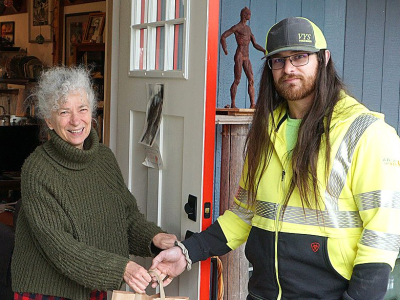New King center director seeks arena for common ground
- Published: January 4, 2007
As the first director of the Coretta Scott King Center for Cultural and Intellectual Freedom, Dana Murray Patterson has an opportunity, she said, to make the difference she has been working toward all her life. She hopes to make the center at Antioch College a beacon for cultural common ground and to connect the campus community with the greater Yellow Springs and Miami Valley communities in working toward greater social equity.
Patterson came to Antioch in early December and will spend the next three months molding and shaping the center for its grand opening on March 30. She plans to seek input from students and faculty as well as community groups while remembering the mission of Coretta Scott King, who spent her life working to eradicate racism and poverty. Patterson expects the center will remain true to King’s mission and will also strive to be much more, she said.
“True cultural and intellectual freedom means having more voices, not less, and once we feel comfortable with who we are, we’re able to open ourselves to what others bring culturally,” Patterson said. “At the center we will aim to have discussions and activities that prompt people to think beyond gender, race, economic status, religion, and all the things that have divided us.”
Antioch’s mission to educate for social change feels familiar to Patterson, who completed her undergraduate studies at Berea College in Kentucky before pursuing her PhD on African-American women in higher education. Directly before coming to Antioch, Patterson was the director of the Talmadge Anderson Heritage House and a member of the board of directors for the vice president of equity and diversity, both at Washington State University. Her work disseminating African-American culture and history and developing an equity scorecard for the WSU campus will inform her outreach work at the Coretta Scott King Center, she said, and help her plan programs that will bring together students and community members of different backgrounds.
Patterson was among 60 applicants for the director’s position, and she received across-the-board support from Antioch students, faculty, staff and administrators, according to Julie Gallagher, chair of the search committee for the director of the King center and an economics professor at the college. In addition to her programmatic contribution at the center, Patterson brings expertise in current research practices and exciting scholarship to campus, where she will teach one academic class. The center’s important foundational work was laid by interim director Beverly Rodgers, who teaches anthropology at Antioch, but Patterson will “really give the center its direction,” Gallagher said.
“Dana brings the experience and also the energy, enthusiasm and a sense of vision to make manifest her goals for social justice,” Gallagher said.
One of the main goals for the Coretta Scott King Center is to connect Antioch with the surrounding community members who have also worked for social justice and those things King believed in so strongly, Gallagher said.
“The name of the center is huge to us, and we have the honor and the burden of carrying that name and achieving the vision of a more socially just world that Coretta Scott King fought for all her life,” she said.
The staff at the King center includes Executive Assistant Autumn Wilson, Bonner Program Coordinators Ona Harshaw and Judith Kintner, Americorps Program Coordinator Jelesia Clybourn and Community Engagement Coordinator Nicole Novak. The first steps are to complete the center’s strategic plan and incorporate feedback from the campus community before the grand opening this spring, Patterson said. The opening will feature cellist Karen Patterson as a performer and a speaker and precedes the second annual Hip Hop Convergence sponsored by the King center.
The center is also sponsoring a “Healing Racism” workshop Feb. 9 to Feb. 11, in connection with the People’s Institute for Survival and Beyond, a national organization founded in 1980 in part by former Yellow Springs resident Jim Dunn, dedicated to moving beyond the symptoms to undoing the causes of racism. In time, Patterson also hopes the center can branch out and partner with its sister organization, the Martin Luther King Center in Atlanta, and perhaps other national and international groups with similar missions.
In addition to directing events at the King center, Patterson will also serve as special assistant to the college president for institutional diversity. She anticipates helping to shape the college campus into a rich community which is truly inclusive, seeks to attract people from diverse backgrounds, and a community which makes all students feel welcome enough to stay and achieve success, she said.
“There’s plenty of work to be done here to support our students as they go out and touch the lives of others,” Patterson said. “If we never get beyond that, developing our students and providing an ethical education for them, we still touch the world because they are our ambassadors, our change agents.”
Patterson came to Antioch by herself last month, leaving her husband and four children behind in Chicago. They will join her this summer, when the family will begin looking for a home in Yellow Springs.
The Yellow Springs News encourages respectful discussion of this article.
You must login to post a comment.
Don't have a login? Register for a free YSNews.com account.












No comments yet for this article.